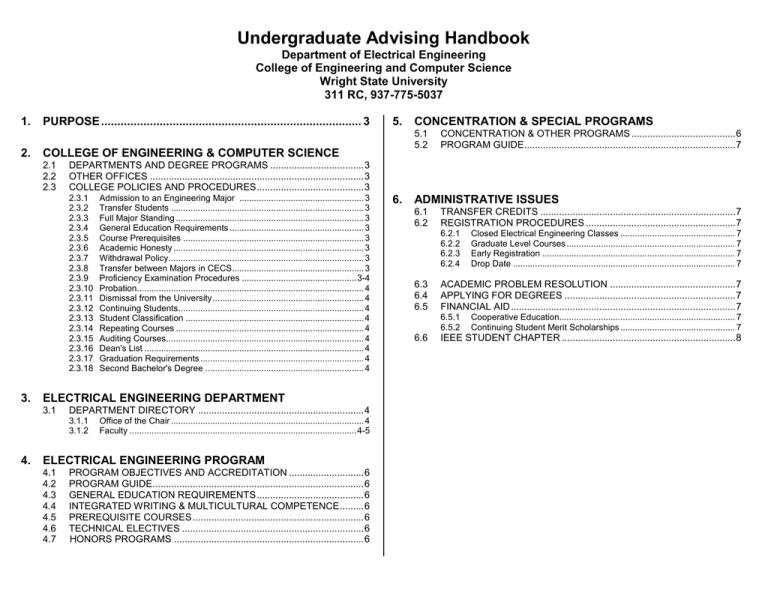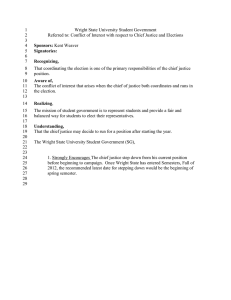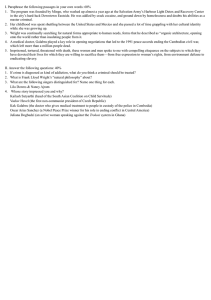Undergraduate Handbook - College of Engineering and
advertisement

Undergraduate Advising Handbook Department of Electrical Engineering College of Engineering and Computer Science Wright State University 311 RC, 937-775-5037 1. 2. PURPOSE ................................................................................ 3 Admission to an Engineering Major ................................................... 3 Transfer Students ............................................................................... 3 Full Major Standing ............................................................................. 3 General Education Requirements ....................................................... 3 Course Prerequisites .......................................................................... 3 Academic Honesty .............................................................................. 3 Withdrawal Policy................................................................................ 3 Transfer between Majors in CECS...................................................... 3 Proficiency Examination Procedures ............................................... 3-4 Probation............................................................................................. 4 Dismissal from the University .............................................................. 4 Continuing Students............................................................................ 4 Student Classification ......................................................................... 4 Repeating Courses ............................................................................. 4 Auditing Courses................................................................................. 4 Dean's List .......................................................................................... 4 Graduation Requirements ................................................................... 4 Second Bachelor's Degree ................................................................. 4 ELECTRICAL ENGINEERING DEPARTMENT DEPARTMENT DIRECTORY .............................................................. 4 3.1.1 3.1.2 4. Office of the Chair ............................................................................... 4 Faculty ............................................................................................. 4-5 ELECTRICAL ENGINEERING PROGRAM 4.1 4.2 4.3 4.4 4.5 4.6 4.7 CONCENTRATION & OTHER PROGRAMS ....................................... 6 PROGRAM GUIDE ............................................................................... 7 DEPARTMENTS AND DEGREE PROGRAMS ................................... 3 OTHER OFFICES ................................................................................ 3 COLLEGE POLICIES AND PROCEDURES ........................................ 3 2.3.1 2.3.2 2.3.3 2.3.4 2.3.5 2.3.6 2.3.7 2.3.8 2.3.9 2.3.10 2.3.11 2.3.12 2.3.13 2.3.14 2.3.15 2.3.16 2.3.17 2.3.18 3.1 CONCENTRATION & SPECIAL PROGRAMS 5.1 5.2 COLLEGE OF ENGINEERING & COMPUTER SCIENCE 2.1 2.2 2.3 3. 5. PROGRAM OBJECTIVES AND ACCREDITATION ............................ 6 PROGRAM GUIDE............................................................................... 6 GENERAL EDUCATION REQUIREMENTS ........................................ 6 INTEGRATED WRITING & MULTICULTURAL COMPETENCE ......... 6 PREREQUISITE COURSES ................................................................ 6 TECHNICAL ELECTIVES .................................................................... 6 HONORS PROGRAMS ....................................................................... 6 6. ADMINISTRATIVE ISSUES 6.1 6.2 TRANSFER CREDITS ......................................................................... 7 REGISTRATION PROCEDURES ........................................................ 7 6.2.1 6.2.2 6.2.3 6.2.4 6.3 6.4 6.5 ACADEMIC PROBLEM RESOLUTION ............................................... 7 APPLYING FOR DEGREES ................................................................ 7 FINANCIAL AID .................................................................................... 7 6.5.1 6.5.2 6.6 Closed Electrical Engineering Classes ............................................... 7 Graduate Level Courses ..................................................................... 7 Early Registration ............................................................................... 7 Drop Date ........................................................................................... 7 Cooperative Education........................................................................ 7 Continuing Student Merit Scholarships ............................................... 7 IEEE STUDENT CHAPTER ................................................................. 8 Students should have 2 of the following 3 criteria: completion of a college prep high school curriculum, a high school GPA of 2.0 or greater or an ACT score of 24 or higher. 1. PURPOSE The purpose of the Electrical Engineering Undergraduate Handbook is to provide electrical engineering (EE), students with answers to commonly asked questions. The book should be used to complement the Undergraduate Catalog, the online Class Schedule and EE Program Guides. Information for courses offered or scheduled for future semesters is often updated; therefore, students should always refer to their academic advisor and online schedule when updating plans. Additionally, students should anticipate changes due to continuous improvements and gather information from the most current publications. The most recent version of the Handbook and Curriculum Guide Sheets may be obtained from the department office. 2. 2.3.2 Transfer Students Applicants with more than 30 hours of previous college work must have a 2.0 GPA (in that college work), to be admitted as an intending or pre-student. Students with less than 30 hours of college level coursework will be considered based on the criteria above. 2.3.3 Full Major Standing To be admitted as a full BSEE major, students must meet the following criteria: completion of PHY 2400/2400L, ENG 1100 (or equivalent), CEG 2170, MTH 2300 (or EGR 1010), with a C or better. Students must also have a 2.25 cumulative GPA in courses taken at Wright State. 2.3.4 General Education Requirements Students must complete general education requirements as outlined in the university catalog. Students will follow the Gen. Ed. program in effect at the time they are admitted to WSU as a degree-seeking student. 2.3.5 Course Prerequisites Students may be denied admission to, or withdrawn from any course for which the prerequisites have not been met. Some prerequisites include a minimum grade. 2.3.6 Academic Honesty The college will always impose the most severe penalty possible for academic dishonesty and permanently dismiss students found guilty of two acts of dishonesty. Students are required to sign an Academic Honesty Policy Form. 2.3.7 Withdrawal Policy Students who receive three or more W's in the last four quarters for courses taught by the college must receive signatures from their advisor and the Department Chair before registering for classes. Withdrawal from all classes for any semester counts as a single W (Policy #1020). 2.3.8 Transfer between Majors in the College of Engineering and Computer Science Prior to transfer, students must have a cumulative GPA of 2.00 for all courses taken in the college and must meet core requirements for admission to the college. Students are encouraged to meet with an advisor for the program they are interested in transferring to. 2.3.9 Proficiency Examination Procedures Students may request a proficiency examination in any course offered by the college. An appropriate faculty member will decide COLLEGE OF ENGINEERING AND COMPUTER SCIENCE 2.1 DEPARTMENTS AND DEGREE PROGRAMS The College of Engineering and Computer Science offers several undergraduate baccalaureate degree programs. Department of Biomedical, Industrial and Human Factors Engineering 207 Russ Center 937-775-5044 B.S. degrees in Biomedical Engineering & Industrial & Systems Engineering Department of Computer Science and Engineering 303 Russ Center 937-775-5131 B.S. degrees in Computer Science & Computer Engineering Department of Electrical Engineering 311 Russ Center 937-775-5037 B.S. degree in Electrical Engineering Department of Mechanical and Materials Engineering 209 Russ Center 937-775-5040 B.S. degrees in Mechanical Engineering & Materials Science & Engineering The undergraduate engineering degree programs are accredited by the Accreditation Board for Engineering and Technology (ABET), Inc. The college also offers graduate programs in each listed discipline, as well as several others. 2.2 OTHER OFFICES Office of the Dean Office of Admissions Raider Connect 2.3 405 Russ Center Phone: 937-775-5001 E148 Student Union Phone: 937-775-5700 130 Student Union Phone: 937-775-4000 Fax: 937-775-5009 Fax: 937-775-5795 Fax: 937-775-4410 COLLEGE POLICIES AND PROCEDURES 2.3.1 Admission to an Engineering Major Students applying for admission (who designate engineering as a major on their application and meet two of the three criteria below), will be admitted as an IECS (intending student), or as a pre-major. 2 whether a proficiency exam is appropriate based on the student's experience and/or knowledge. Only one proficiency exam will be permitted in any course. Students who fail to satisfactorily complete a course will not be given an exam in that course. 2.3.16 Dean's List Students who attain a GPA of 3.4 or higher for at least 12 hours of graded classes (pass/unsatisfactory classes do not apply), during a semester are placed on the Dean's List. 2.3.10 Probation Students are placed on academic probation when their GPA drops below 2.00.Students on probation must see an advisor to register for classes. 2.3.17 2.3.11 Dismissal from the University Students may be dismissed if they remain on academic probation for more than two semesters. Students who are dismissed are not permitted to enroll for courses for a full calendar year. 2.3.12 Continuing Students Continuing students are defined as students who do not have a period of three consecutive semesters during which they are not enrolled at WSU and may meet university graduation requirements that were in effect (or subsequent), when they entered the university. Noncontinuing students must meet university requirements in effect when they are readmitted. Students must meet degree program requirements in effect when they are admitted to a department. Departments may revise a student's requirements if the student has not completed the program in seven years. 2.3.13 Student Classification Undergraduate students are classified by the total number of credit hours earned at WSU plus transfer hours. Freshman = 0-29; sophomore = 30-59; Junior = 60-89; Senior = 90+. This classification is independent of the student's position in the degree program. For example, a student may have 100 or more hours of credit, but is considered a freshman in the degree program in terms of completing the required courses listed on the program guide. Students use the university classification system for enrollment in classes at the beginning of each semester, i.e. seniors first followed by juniors, etc. Graduation Requirements To be eligible for the BS degree students must: 1. Complete all requirements in one of the college's degree programs. 2. Fulfill the university's general education requirements. 3. Complete all writing intensive and multicultural competency courses for general education and all writing intensives in the major. 4. Complete the residency requirement of 30 credit hours at Wright State University (15 of which must be earned in courses numbered 3000 or above). At least 12 of the last 30 hours of the degree must be taken in residence. 5. Complete all academic work with at least a 2.0 cumulative grade point average and at least a 2.0 cumulative grade point average in all engineering and computer science courses taken at Wright State University. Students should meet with their academic advisor before their last semester to be sure they will complete all requirements for graduation. Students are encouraged to check their DARS report to monitor their degree progress 2.3.18 Second Bachelor's Degree Students must earn at least 30 credit hours beyond the minimum requirements for the first degree. At least the last 30 credit hours of coursework are to be taken at WSU, 15 of which must be in courses numbered 3000 or above. Students must complete at least 30 credit hours, none of which may be applied toward the first degree. 2.3.14 2.3.15 3. ELECTRICAL ENGINEERING DEPARTMENT Repeating Courses Students may repeat any course in which they earned a grade of B, C, D, F, or X. Students are allowed 5 grade replacements. When a student repeats a course, only the second grade is used in calculating the student’s GPA. The second grade is used even if it is lower. If a student repeats a course twice, that counts as 2 of the allowable five repeats. 3.1 DEPARTMENT DIRECTORY Auditing Courses If class space permits, students may audit a course with written approval from the instructor before enrolling in the class. Students may not change from audit to credit or from credit to audit after the first week of class. 3 3.1.1 Office of the Chair 311 RC Ph: 937-775-5037 / Fax: 937-775-3936 Dr. Brian Rigling Chair Ryan Hamilton Academic Advisor Vickie Slone Administrative Assistant to the Chair Shelley Damallie Office Assistant Lori Luckner Administrative Specialist 3.1.2 Faculty Elliott Brown, Professor and Endowed Chair, Experimental Sensor Physics, Ph.D., California Institute of Technology, 1985. Research interests include: mm-wave and THz mixers made from semiconductor hot-electron bolometers and magnetically-quantized photoconductors. 109 University Park Bldg B, 775-4903; elliott.brown@wright.edu. Saiyu Ren, Associate Professor, Ph.D. Wright State University 2008. Research interests include: RF and mixed signal integrated circuit design with applications to wireless transceivers, communications, and signal processing. 328 RC. 775-5051, saiyu.ren@wright.edu Henry Chen, Professor, Ph.D., Minnesota, 1989. Research interests include: very large scale integrated circuit design, built-in self-test design, test generation and scheduling, reduced instruction set computer architecture and fault tolerant computing. 325 RC; 775-5056; henry.chen@wright.edu. Brian Rigling, Professor and Chair, Ph.D., Ohio State University, 2003. Research interests include: sensor signal processing. 311 RC, 775-5100, brian.rigling@wright.edu. John Emmert (Marty), Professor, Ph.D., University of Cincinnati, 1999. Research interests include: physical design automation for VLSI, VLSI systems, physical VLSI design, reconfigurable systems, digital CD, VHSIC hardware description language (VHDL), verilog, digital design, VLSI interconnections, analog integrated circuit design, signal processing, digital control systems. 338 RC, 775-5023, marty.emmert@wright.edu. Michael Saville, Assistant Professor, Ph.D., University of Illinois 2006. Research Interest include: hybrid applications of signal processing, electromagnetic and computational methods for polarization-based feature extraction in synthetic aperture radar. 422 RC, 775-5169; michael.saville@wright.edu. Fred Garber, Associate Professor, Ph.D., Illinois, 1983. Research interests include: communication systems, target recognition, information theory, and pattern theory. 312 RC; 775-5033; fred.garber@wright.edu. Arnab Shaw, Professor, Ph.D., Rhode Island, 1987. Research interests include: estimation theory, spectrum estimation and neural network based speech processing. 427 RC, 775-5064; arnab.shaw@wright.edu. Steve Gorman, Instructor, Ph.D., University of Kentucky, 1988. Research interest include: signal and communication processing related to geolocation of modern signal transmitters including cellular and PC devices. 329 RC, 775-5783; steve.gorman@wright.edu. Raymond Siferd, Professor Emeritus, Ph.D., Air Force Institute of Technology, 1977. Research interests include: very large scale integrated circuit design, signal processing and analog integrated circuit design. 324 RC, 775-5058; ray.siferd@wright.edu. Ryan Hamilton, Instructor, MSc., Miami University, 2002. 311 RC, 775-5037; ryan.hamilton@wright.edu. Zhiqiang Wu, Associate Professor, Ph.D., Colorado State University, 2002. Research interests include: 3G cellular, CDMA systems, multicarrier architectures, and frequency domain processing. 421 RC, 775-5060; zhiqiang.wu@wright.edu. Lang Hong, Professor and Director Wright State International Gateway, Ph.D., Tennessee, 1989. Research interests include: computer vision, image processing and pattern recognition, robotic sensing and control, multisensor systems, stochastic systems, system modeling and estimation, and multitarget tracking. 442 RC; 775-5053; lang.hong@wright.edu. Kefu Xue, Associate Professor, Ph.D., Pennsylvania State, 1987. Research interests include: digital image processing, computer vision and special purpose architecture for signal processing. 313 RC, 775-5063; kefu.xue@wright.edu. Marian Kazimierczuk, Distinguished Professor, Ph.D., Warsaw Technical, 1978. Research interests include: radio frequency and power electronics, semiconductor device modeling, circuit theory and computer-aided design. 418 RC, 775-5059; marian.kazimierczuk@wright.edu. Xiaodong (Frank) Zhang, Associate Professor, Ph.D., University of Cincinnati, 2001. Research interests include: intelligent control, integrated health management, integrated and cooperative control and smart adaptive systems. 335 RC, 775-4463; xiaodong.zhang@wright.edu. Teri Piatt, Lecturer, PhD., University of Colorado, Boulder, 1999. Research interests include technical communications, circuits, linear systems, and control systems. 405 RC, 775-2757; teri.piatt@wright.edu. Yan Zhuang, Associate Professor, Ph.D., Johannes Kepler University, Linz, Austria, 2000. Research interests include: RF and microwave technology, magnetic materials, nano-composite materials, high speed Si-based electronics, MEMs/NEMs, micro aerial vehicle and sensors. 421 RC, 775-4556; yan.zhuang@wright.edu. Kuldip Rattan, Professor Emeritus, Ph.D., Kentucky, 1975. Research interests include: control theory, robotics, microprocessor applications and bioengineering. 108 RC, 775-5052; kuldip.rattan@wright.edu. 4 4. 4.5 ELECTRICAL ENGINEERING PROGRAM 4.1 Prerequisite courses are those required for completion prior to attempting a following related course. Students must earn a passing grade in prerequisite courses before attending the following related course. This policy is important because the faculty has carefully structured the curriculum so that courses build upon each other. Students who have not met the prerequisite may be dropped from the course at the instructor’s discretion. PROGRAM OBJECTIVES AND ACCREDITATION The undergraduate electrical engineering degree program at Wright State University is accredited by the Accreditation Board for Engineering and Technology, Inc. The educational objectives of the Electrical Engineering program are: Prepare students for employment as electrical engineers Prepare students for success in graduate studies Prepare students to solve real world engineering problems using modern electrical engineering analysis and design techniques Offer a curriculum and schedule of classes specifically tailored to help traditional and non-traditional students to complete degree requirements Offer a program which is recognized for the quality and strength of its laboratory component 4.2 4.6 PROGRAM GUIDE 4.7 HONORS PROGRAMS The EE Department recognizes students of superior quality and motivation by encouraging participation in honors programs. These programs provide students with opportunities to develop interests and skills by encouraging them to take coursework that is more challenging than the regular curriculum. Upon admission to the College of Engineering and Computer Science, each student is given a current program guide. Prior credits accepted toward the degree are annotated on the guide and the student is assigned a faculty advisor. Because the curriculum and graduation requirements sometimes change, it is important that students meet with their advisor periodically to review their progress. A registration PIN will remain on the students’ account until they meet the requirements for full major status. The PIN is removed once students have met with their academic advisor. There are three types of honors programs available for EE majors. They are as follows: 1. "With Honors in Electrical Engineering" (departmental honors) 2. "General Studies Honors" 3. "University Honors" General Studies and University Honors programs are described in more detail in the undergraduate catalog. For specific questions, please contact the Honors Department (243 Millett Hall), at 775-2660. When admitted to the department, students normally follow the program guide. If a student follows an outdated guide (more than seven years old), he or she may be required to take additional courses to ensure currency and competency before graduating. If a student transfers from one major to another, the student will normally follow the current program guide for the transfer term. 5. CONCENTRATIONS AND SPECIAL PROGRAMS 5.1 CONCENTRATION AND OTHER PROGRAMS The department also offers an EE degree with a concentration in Engineering Physics. Completion of this program includes a designation on official transcripts and diplomas. GENERAL EDUCATION REQUIREMENTS Wright State’s baccalaureate degree program requires students to complete the General Education requirements outlined in the University Catalog. MTH 2300 and 2310 meet the mathematical skills requirement and PHY 2400, 2400L, 2410, and 2410L meet the natural sciences requirement. EGR 3350 meets the second communication course requirement. 4.4 TECHNICAL ELECTIVES The Program Guide requires that each student complete at least eight credit hours of technical elective courses. These electives are defined as any course numbered 2000 and above in the Colleges of Engineering and Computer Science, Science and Mathematics or Business and Administration. Electives must be approved by the student's advisor. Redundant courses such as MTH 2240, 2280, BME 3511, 3511L, 3512, and 3512L will not count toward technical elective hours. Courses cross-listed with EE courses may not be used as technical electives. Hours registered for co-op internship may not count toward technical electives. Other courses may be excluded as determined by the department. Each year, the faculty evaluates the electrical engineering curriculum to ensure its currency and relevance. Upon completing that review, an updated program guide is published. That guide includes courses required to complete the program and the recommended pattern for taking courses. 4.3 PREREQUISITE COURSES The department also offers a pre-medical focus and a pre-law focus. These programs meet requirements for application to most US medical and law schools. The pre-med and pre-law programs do not carry a special designation on transcripts and diplomas. Integrated Writing and Multicultural Competence As part of Wright State’s General Education core, all students must complete two courses labeled integrated writing (IW), and two courses designated for multicultural competence (MC). 5 5.2 6.2.4 PROGRAM GUIDE Each of the above mentioned programs has a specific program guide which is different from the general EE program guide. Students pursuing those programs must follow the appropriate program guide. 6.3 Academic problems concerning rules of the department, college or university may be addressed through the petitions process. Petitions should be submitted to the Office of the Registrar. The petition application should cite the specific rule for which an exception is being sought. The petition will be forwarded to the appropriate standing petitions committee where it will be evaluated by faculty and staff members. The committee's decision will be communicated in writing to the petitioner. The committee usually meets once a month so immediate action is not the norm. TRANSFER CREDITS Some students have earned credits at other colleges or universities and wish to transfer those credits. The Office of the Registrar decides whether or not a course is acceptable for transfer. Transferability of credits for a particular course rests with the college and/or department within the university requiring that course. To maintain consistency, departmental transfer credits are evaluated in the Office of the Dean or Chair and annotated on the student's program guide. There are articulation agreements between Wright State University and other colleges (such as Sinclair Community College), that guarantee select courses will transfer. These courses are usually at the freshman or sophomore level. The college does not award transfer credits for engineering courses numbered 3000 or above unless those credits were earned under a Bachelor of Science engineering program accredited by ABET in the US. This policy arises from the need to maintain the integrity of ABET accredited engineering degrees. Transfer credits may not be given for outdated coursework. 6.2 6.4 Closed Electrical Engineering Classes A class taught by a faculty member of the Electrical Engineering Department may close because the class has reached its authorized capacity. In this case, students may place their name on a waiting list, if one is available. When a seat opens in the course, students will be contacted on a first listed, first served basis and given registration instructions by a staff member. 6.2.2 Graduate Level Courses Under the "Senior Permission" program, seniors who have completed 90 credit hours toward their baccalaureate degree and have earned a cumulative GPA of 3.0 or above may apply for permission to choose select graduate courses for graduate or undergraduate credit. Courses must be approved by the student's advisor, Department Chair and the School of Graduate Studies. Forms are available at the Graduate Studies Office. 6.2.3 Early Registration Wright State University provides students with an opportunity to register weeks before classes start each semester. Registration periods are available online. In Wings Express, students can select “Registration Status” to view when their registration window opens. Many classes have limited enrollment. Therefore, students with time constraints (full-time employment or approaching graduation), should take advantage of the early registration process to avoid being "closed out" of a class. APPLYING FOR DEGREES Before graduating, a student must apply for a degree. Applications are due by the end of the first week of the term in which the student plans to graduate. Applications are available electronically through Wings Express. Because it takes time to post grades and check graduation requirements, transcripts reflecting degrees awarded are not usually issued until 30 days after the end of the semester. If the first graduation attempt is unsuccessful, students must reapply for a degree on each successive attempt. Students who expect to complete their degree requirements during fall and spring semester may participate in May commencement exercises. Those who expect to complete their degree requirements during summer may participate, with permission, in fall or spring graduation. REGISTRATION PROCEDURES 6.2.1 ACADEMIC PROBLEM RESOLUTION It is usually best to informally resolve problems at the lowest level in any organization. Therefore, it is advisable to first discuss academic problems with the faculty member involved. 6. ADMINISTRATIVE ISSUES 6.1 Drop Date See the semester class bulletin for current drop dates. 6.5 6 FINANCIAL AID Wright State University offers a variety of financial assistance programs such as grants, loans, cooperative education and student employment. Application forms and information are available at Raider Connect (775-4000). 6.5.1 Cooperative Education The Cooperative Education Program (Co-op), at Wright State University provides students with an opportunity to integrate classroom theory with practical, career-related work experience. Engineering co-op students usually alternate on-campus study with related jobs, primarily in local industries. Students can gain valuable experience, test career interests, learn more about the engineering field, develop job-related skills, as well as earn money to meet college expenses. Students who are interested may schedule appointments with a member of the Brandeberry Career Center. 6.5.2 Continuing Student Merit Scholarships Students with excellent grades ( 3.0 GPA), may apply for various merit scholarships sponsored by faculty and staff, corporate interests and individuals. Applications are available at the Office of Financial Aid and are usually due annually by March 15th. Awards are selected by a faculty committee. 6.6 IEEE STUDENT CHAPTER The Department of Electrical Engineering supports a student chapter of the Institute of Electrical and Electronics Engineers (IEEE), the largest professional society in the world. The Chapter provides a forum for students to meet, organize professional activities and exchange ideas of common professional interest. For example, student members organize tours of companies and participate in the paper presentation contest organized by the Dayton section of IEEE. Membership also entitles students to receive the periodical, IEEE Spectrum. Those interested in the benefits and privileges of membership are invited to contact student chapter officers or the Electrical Engineering Department (311 RC, 937-775-5037). You may apply for membership by using the IEEE website at http://www.ieee.org/. 7




